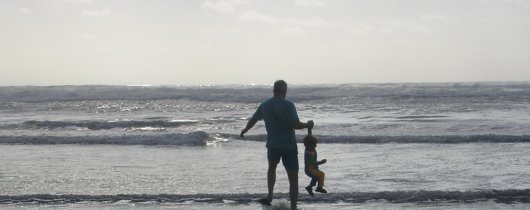Camping by Mark Stone
February 2010. Nathan and I are sitting in the family room one evening, having the following conversation.
Nathan: "Dad, can we go camping again?"
Me: "Not yet, Nathan. Its too cold outside. Maybe in the summer when its warmer."
Nathan: "Will we have a campfire?"
Me: "Yes, Nathan."
Nathan: "And sleep in sleeping bags in a tent?"
Me: "Yes, Nathan."
Nathan: "I like camping."
Nathan had recently turned four, and this conversation is remarkable in several ways. What comes out of Nathan's mouth sounds more like this:
"Can we go cappig again? Will we have a capfiyah? An seep in seepig bags in a tet? I like cappig."
The articulation is far from perfect, even for a four year old. Multi-syllable words are often slurred, and middle consonants or two-consonant combinations trip him up. As of February 2010, Nathan had been in pre-school for a year, through a wonderful state-funded program for children with special developmental needs. Part of his four days a week at pre-school included time with a speech therapist, and in addition he had been seeing a speech therapist outside of school for almost two years at this point. Today he still sees a speech therapist, and he will return to pre-school in a few weeks. His progress has been fantastic, but we are ever mindful that the journey is long.
The progress has been remarkable. The last time before this conversation that I took Nathan camping was in July of 2009, and at that point he essentially could not speak. He had a vocabulary of about ten spoken words, and expressed himself mostly through humming, gesturing, pointing, and some rudimentary sign language.
Neither Karen nor I knows the root cause of Nathan's delay in speech development. Neither does his pediatrician, his teacher, either of his speech therapists, or any of the neurologists or other specialists we have taken him to. But Nathan's situation is not unique. Today there are literally hundreds of thousands of children with comparable delays in speech from a variety of undiagnosed causes. They are not autistic. They do not have broad cognitive development delays. But they are all on their own unique, remarkable journeys.
Of course what is most astonishing about this conversation is that it could happen at all. For Nathan to initiate this topic of conversation, and to introduce the details that he did, he had to have a clear, precise and structured memory of our camping trips of the previous summer, trips we took at a time when he really could not speak. How did he do that? How was he able to summon up those memories? What framework of private language had he developed in his head, so that he had some structure in which to apprehend and maintain these very detailed memories?
Nathan's journey to speech has been a wonder, and I feel nothing but privileged to have been a fellow traveler with him.


